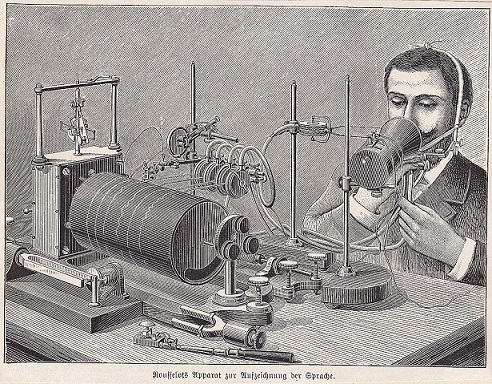|
Vowels: "a", "e", "i", "o" and
"u"
Umlaute: ä/Ä
ӧ/Ӧ ϋ/Ü
Diphtongs: 2
different vowels coming together: for example, ei, ie, au
One differentiates between long and short vowels and umlaute.
Diphtongs are always long.
|

an early example of experimental phonetics |
|
|
"a"
"a" followed by one consonant or an unpronounced "h", as well
as the double vowel "aa" is generally long. It is pronounced
similar to the "a" in English "spa", but with a wide-open mouth.
| Abend, Radio, Name, Plan, Bahn, fahren, Zahl,
Aachen, Paar, Haare
|
'
|
"a" followed by two or more consonants is usually short. It is
pronounced similar to the "u" in English "Hun".
|
Johann Sebastian Bach, Frankfurt, Ratte, danke, Lampe, Stadt,
acht, Tasche |
'
|
|
|
"e"
"e" followed by one consonant or an unpronounced
"h", as well as the double vowel "ee" is generally long. It is
pronounced similar to the "ay" in English "say", but with lips spread
very wide.
|
geben, Leder, Tegel, nehmen, Kehle, Mehl, zehn, Fee, Kaffee, Tee |
|
"e"
followed by two or more consonants is usually short.
It is pronounced similar to the "e" in English "text", but a bit
shorter.
| Bett,
Adresse, kennen, Netz, Rente, senden, testen, Text, Zelle, elf |
|
"e" in an unstressed prefix or suffix is pronounced similar to the "e"
in English "begin".
|
beginnen, besuchen, gehören, gefallen, getrunken, gesucht, gefahren,
Gemälde, Gemüse, Gebirge
Name, Freunde, wohne, heiße, Dose, Flasche, Spiele, Farbe, Liebe, Sprache |
|
"er" at the end of a word is pronounced like the "a" in English
"sofa", the "r" is not pronounced.
| Oper, oder, leider, Partner, Pullover, Computer,
Einwohner, Hammer, Leder, locker |
|
|
|
"i"
"i" followed by one consonant or an unpronounced "h" is generally
long. It is pronounced like the "ee" in English "meet".
| Tiger, Kino, lila, Krise, Ire, Stil, Visum,
Mine, Tirol, ihn |
' |
"i" followed by two or more consonants is usually short. It is
pronounced like the "i" in English "fit".
| Blitz, bitte, Film, Mittwoch, Ring, Kind, Milch, billig,
singen, Geschwister |
' |
|
|
"o"
"o" followed by one
consonant or an unpronounced "h", as well as the double vowel "oo" is
generally long. It is pronounced similar to the "o" in English "so", but
with exaggeratedly rounded lips.
| Rose, Brot, rot, Hose, schon, Sohn, Lohn, wohnen, Boot, Moos |
' |
"o" followed by two or more consonants is usually short. It is
pronounced like the "o" in English "sock".
|
kommen, Sonne,
Onkel, Woche, Post, Norden, Montag, Most, folgen, Loch |
|
|
|
"u"
"u" followed by one
consonant or an unpronounced "h" is generally long. It is pronounced
similar to the "oo" in English "moon", but with lips more rounded.
|
Blume, Juni, Juli,
Lupe, Kugel, nur, duzen, ruhig, Stuhl, Uhr |
|
"u" followed by two or more consonants is usually short. It sounds like
"u" in English "bush", but even shorter.
| Butter, Dummkopf,
Bundesliga, Stuttgart, muss, Kuss, null, Nummer, Suppe, Pudding |
|
|
"ä"
"ä" followed by one consonant or an unpronounced "h" is generally long.
It is pronounced similar to the "ai" in English "airy", but with a more open
mouth.
| Universität,
Qualität, Käse, erklären, Räder,
Rumänien, spät, zählen,
wählen, fährst |
|
"ä" followed by two or more consonants is usually short. It is
pronounced similar to the "e" in English "get", but with a more open mouth.
| mästen, Länder, März.
Äpfel, Gäste, Mächte,
Rätsel, hätte, Nässe,
härter |
|
|
|
"ö"
"ö" followed by one
consonant or an unpronounced "h" is generally long. It is pronounced
similar to the "eu" in French "peu a peu". Keep your tongue in same
position as for long "e", but round your lips as for long "o".
| Öl, hören, blöd,
mögen, Römer, klönen, Söhne, Föhn, Höhle, fröhlich |
|
|
|
"ü"
"ü" followed by one
consonant or an unpronounced "h" is generally long. It is pronounced
like the "ue" in French "Rue de Rivoli". Keep your tongue in same
position as for long "i", but round your lips as for long "u".
| lügen, üben,
Tübingen, Lübeck, Zürich, Lüdenscheid, grün, Mühle, Stühle, Reiseführer |
'
|
"ü" followed by two or more consonants is usually short. It is a shorter version
of the long "ü". Keep your tongue in same position as for long "i", but
round your lips as for short "u".
|
Düsseldorf, München, küssen, Nüsse, Stück, Rücken,
glücklich, Schlüssel, Mücken, Rüssel
|
|
|
| "ei", "ai", "ay", and "ey" are
pronounced like the "y" in English "my".
"ei" is very common, whereas there aren't many words with "ai", "ay" and "ey".
|
Einstein, Reis, Polizei, Eis, Rhein, eins, zwei, drei, fein, kein
Main, Thailand, Mai, Kaiser, Hai, Laich
Bayern
Loreley |
'
|
|
"au" is pronounced like the "ou" in English "mouse".
| Sauerkraut, Audi,
Auto, Maus, Haus, blau, braun, grau, schauen, klauen |
'
|
|
"äu" and "eu" are pronounced like the "oy" in English
"boy".
|
Euro, Deutschland, Schadenfreude, Freund, Teufel, neu, heute, Leute,
Meute, reuen
Bäume, träumen, Schäume, Häute, Häuser, kräuseln,
Kräuter, Läuse, Mäuschen, Fäulnis |
'
|
the combination "ie" is usually pronounced like the "ee" in
English "meet".
|
Bier, Tier,
vier, nie, wieder, Griechenland, Industrie, Technologie, Chemie, Biologie |
|
Exceptions:
"ien" at the end of the names of many countries is pronounced like the
English "yen".
| Belgien, Italien, Spanien, Rumänien, Indien, Bulgarien,
Indonesien, Australien, Tschechien, Arabien |
|
"ie" at the end of a few words is pronounced like the "ye" in English
"yen".
| Familie,
Komödie, Tragödie |
' |
|